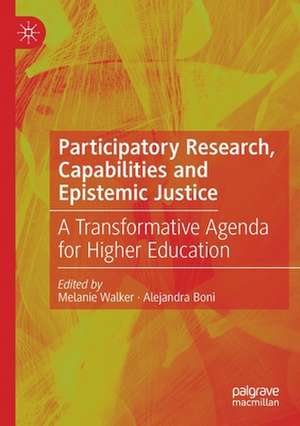Participatory Research, Capabilities and Epistemic Justice: A Transformative Agenda for Higher Education
Editat de Melanie Walker, Alejandra Bonien Limba Engleză Paperback – 28 noi 2021
| Toate formatele și edițiile | Preț | Express |
|---|---|---|
| Paperback (1) | 888.97 lei 6-8 săpt. | |
| Springer International Publishing – 28 noi 2021 | 888.97 lei 6-8 săpt. | |
| Hardback (1) | 894.16 lei 6-8 săpt. | |
| Springer International Publishing – 28 noi 2020 | 894.16 lei 6-8 săpt. |
Preț: 888.97 lei
Preț vechi: 1084.11 lei
-18% Nou
Puncte Express: 1333
Preț estimativ în valută:
170.10€ • 178.55$ • 141.19£
170.10€ • 178.55$ • 141.19£
Carte tipărită la comandă
Livrare economică 10-24 aprilie
Preluare comenzi: 021 569.72.76
Specificații
ISBN-13: 9783030561994
ISBN-10: 3030561992
Pagini: 271
Ilustrații: XIX, 271 p. 25 illus.
Dimensiuni: 148 x 210 mm
Greutate: 0.39 kg
Ediția:1st ed. 2020
Editura: Springer International Publishing
Colecția Palgrave Macmillan
Locul publicării:Cham, Switzerland
ISBN-10: 3030561992
Pagini: 271
Ilustrații: XIX, 271 p. 25 illus.
Dimensiuni: 148 x 210 mm
Greutate: 0.39 kg
Ediția:1st ed. 2020
Editura: Springer International Publishing
Colecția Palgrave Macmillan
Locul publicării:Cham, Switzerland
Cuprins
Chapter 1. Epistemic justice, participatory research and valuable capabilities; Melanie Walker and Alejandra Boni.- Chapter 2. Expanding epistemic capability in participatory decision-making processes: The Universidad de Ibagué capabilities list; Diana Velasco and Alejandra Boni.- Chapter 3. Expanding capabilities for epistemic justice through social innovation: The case of business and management courses in UNIMINUTO, Colombia; Sergio Belda-Miquel and Carmen Leonor Avella Bernal.- Chapter 4. A Freirian approach to epistemic justice: Contributions of action learning to capabilities for epistemic liberation; Monique Leivas, Álvaro Fernández-Baldor, Marta Maicas-Pérez and Carola Calabuig-Tormo.- Chapter 5. Epistemic capabilities in the context of oppression: Reflections from an action learning programme in Salvador, Brazil; Lori Keleher and Alexandre Apsan Frediani.- Chapter 6. Democratic capabilities research: Exploring contextual challenges and contributions of participatory research towards epistemic justice; Carmen Martinez-Vargas.- Chapter 7. Participatory video as a tool for cultivating political and feminist capabilities of women in Turkey; F. Melis Cin and Rahime Süleymanoğlu-Kürüm.- Chapter 8. A participatory photovoice project: Towards capability expansion of ‘invisible’ students in South Africa; Melanie Walker and Mikateko Mathebula.- Chapter 9. Graffiti as a participatory method fostering epistemic justice and collective capabilities among rural youth: A case study in Zimbabwe; Tendayi Marovah and Faith Mkwananzi.- Chapter 10. Potential of participatory action research processes to overcome epistemic injustice in non-ideal university settings; Alejandra Boni and Melanie Walker.
Recenzii
“This wide-ranging edited volume by Melanie Walker and Alejandra Boni beautifully captures the potential for university-based participatory action research (PAR) to influence epistemic spaces in the wider community. Moreover, and perhaps most interestingly, it does so by invoking the insights of the capability approach. … The editors deserve to be congratulated for this collection of essays that lend both depth and breadth to the book. … The 10 chapters in this excellent volume help us understand why.” (Stacy J. Kosko, Journal of Human Development and Capabilities, Vol. 23 (1), 2022)
Notă biografică
Melanie Walker is Distinguished Professor in the Centre for Development Support at the University of the Free State, South Africa, and holds the South African Research Chair in Higher Education and Human Development. Her research interests focus on social justice and human development in higher education in the global South.
Alejandra Boni is Professor at the Universitat Politècnica de València, Spain and Deputy Director of Ingenio (CSIC-UPV). Her research interest focus on human development, higher education, global citizenship and transformative innovation.
Textul de pe ultima copertă
"This marvellous collection assembles a set of highly insightful essays that blend the capability approach and participatory action research in order to fight epistemic injustices in higher education contexts. Highly congenial to Freirean pedagogy, the collection vividly demonstrates the epistemic and emancipatory power of participatory knowledge production from below."
—Julian Culp, The American University of Paris, France
"This is a splendid book which makes a significant, important and original contribution to the broad field of education and social justice. It successfully brings together the concepts of epistemic justice, participatory research and capabilities formation in eight exciting cases of substantial projects which involve participants who have been traditionally silent or silenced in different global contexts."
—Monica Mclean, University of Nottingham, UK
Melanie Walker is Distinguished Professor in the Centre for Development Support at the University of the Free State, South Africa, and holds the South African Research Chair in Higher Education and Human Development. Her research interests focus on social justice and human development in higher education in the global South.
Alejandra Boni is Professor at the Universitat Politècnica de València, Spain and Deputy Director of Ingenio (CSIC-UPV). Her research interests focus on human development, higher education, global citizenship and transformative innovation.
Caracteristici
Highlights the importance of epistemic in/justice as a foundation to a decolonial approach to knowledge Draws on case studies from around the globe to argue for an epistemic ecology of knowledge Illustrates how epistemic capabilities can be marginalised by the academy as well as their potential
